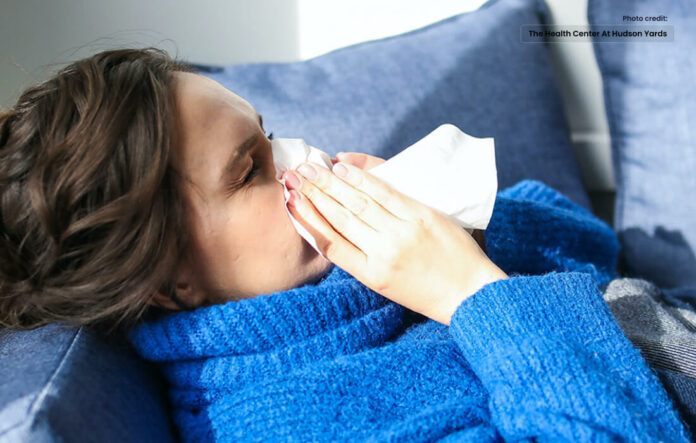Learn about the symptoms and effective strategies of seasonal allergy.
Your health and general well-being can suffer greatly from seasonal allergy and find out about typical symptoms and practical ways to get rid of them for a better quality of life.
Seasonal allergies are an unwanted guest that many people have to deal with as the seasons change. Allergens are everywhere, whether it’s in the blossoming spring flowers or the dropping autumn leaves; they cause uncomfortable symptoms that can greatly affect day-to-day living.
Read More Informative Articles in Urdu
We’ll examine the signs and symptoms of seasonal allergies in this in-depth guide, along with a number of practical methods to lessen their impact and give you back control over your health and wellbeing.
Seasonal allergies: what are they?
Millions of Americans suffer from seasonal allergies, which are sometimes known as hay fever or allergic rhinitis. They are the outcome of an allergic response to the mold and plant growth cycles.
Pollen and spores are released into the atmosphere by plants and mold as they grow. Inhaling pollen and spores might result in symptoms such as discomfort and inflammation.
Some people may only have symptoms such as occasional sneezes a few times a year. However, for some people, seasonal allergies can last for weeks or months and result in symptoms including headaches, watery eyes, congestion, runny or itchy noses, and more.
Knowing About Seasonal Allergies
Seasonal allergies, sometimes referred to as allergic rhinitis or hay fever, are caused by an overreaction of the immune system to environmental allergens. Mold spores and pollen from grasses, plants, and trees can be among these allergies.
Seasonal allergy sufferers’ immune systems react to these allergens as dangerous invaders and release substances like histamine, which set off a chain reaction of symptoms.
Typical Seasonal Allergy Symptoms
- Sneezing: One of the most typical signs of seasonal allergies is sneezing. It happens when allergens irritate the mucous membranes in the nose, causing abrupt, uncontrollable air expulsions.
- Runny or Stuffy Nose: A runny or stuffy nose is another common sign of seasonal allergies. This happens when the body produces more mucus in an effort to flush out allergens, which causes nasal congestion or a persistent drip.
- Red, Watery, Itchy Eyes: Seasonal allergies can also result in red, watery, and itchy eyes. This happens when allergens get in contact with the delicate eye membranes, causing inflammation and discomfort.
- Itchy Ears or Throat: Seasonal allergies can cause itching in the ears or throat for certain people. When exposed to allergens over an extended period of time, this painful sensation may get worse.
- Exhaustion: Long-term allergy exposure might result in a loss of energy and exhaustion. This is frequently ascribed to the body’s immunological reaction, which over time may strain the system.
- Coughing: As the body tries to remove allergens, seasonal allergies can irritate the airways and cause coughing. Those who have asthma or other underlying respiratory disorders are more likely to have this discomfort.
Successful Techniques for Handling Seasonal Allergies
- Avoidance: Reducing your exposure to allergens is one of the best ways to manage seasonal allergies. This could entail closing windows during periods of high pollen count, remaining inside during these times, and utilizing air purifiers to filter out allergens from the air.
- Allergy drugs: Both prescription and over-the-counter allergy drugs help relieve symptoms like congestion, itching, and sneezing. Often used to relieve allergy symptoms are nasal corticosteroids, decongestants, and antihistamines.
- Nasal Irrigation: To remove mucus and allergens from the nasal passages, a saline solution is rubbed in them. This technique is also referred to as nasal saline irrigation or nasal douching. This may lessen seasonal allergy symptoms and clear up nasal congestion.
- Allergy Shots: Immunotherapy, or allergy shots, may be advised for people with severe or ongoing allergies. These injections, which gradually desensitize the immune system to allergens in trace amounts, lessen the intensity of allergic reactions.
- Natural Solutions: Acupuncture, herbal supplements, and locally produced honey are a few natural solutions that may help alleviate seasonal allergies. Some people find these therapies helpful in managing their symptoms, despite the paucity of studies on their efficacy.
- Good Lifestyle Practices: Developing good lifestyle practices helps boost immunity and lessen the intensity of allergy symptoms. This include controlling stress, exercising frequently, maintaining hydration, and eating a balanced diet.
Conclusion
Although seasonal allergies can have a major negative influence on one’s quality of life, they can be successfully managed with the correct information and techniques. Through comprehension of the typical indications of seasonal allergies and use of suitable solutions, people can reduce their suffering and fully appreciate the splendor of every season. Those who experience seasonal allergies can find relief through natural therapies, medication, or avoidance strategies.
Don’t forget to speak with a medical expert for individualized guidance and choices for treatment catered to your unique need. You may beat seasonal allergies and welcome each season with a fresh sense of vitality and wellness with proactive management and lifestyle changes.
Also read this: Causes and Symptoms of Skin Allergies




